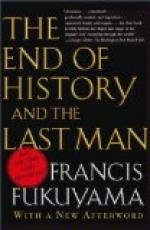|
This section contains 2,581 words (approx. 9 pages at 300 words per page) |

|
SOURCE: “To the 21st Century,” in Commentary, Vol. 93, No. 3, March, 1992, pp. 51-4.
In the following review, Johnson provides analysis of The End of History and the Last Man and refutes Fukuyama's thesis. According to Johnson, “History does not end; it simply becomes more complicated.”
Educated people have an extraordinary appetite for absolute answers to historical questions, answers which wise historians know cannot be forthcoming. It is astonishing that Hegel's reputation survived his absurd declaration that history had ended with Bonaparte's victory over Prussia at Jena in 1806. Yet Hegel went on to hold what was then the most enviable academic post in Germany, the chair of philosophy in Berlin, and to write much more clever and influential nonsense. In due course his thoughts were transmuted by Marx not merely into a set of absolute answers about where history was heading but into a program for accelerating the process. Until...
|
This section contains 2,581 words (approx. 9 pages at 300 words per page) |

|


